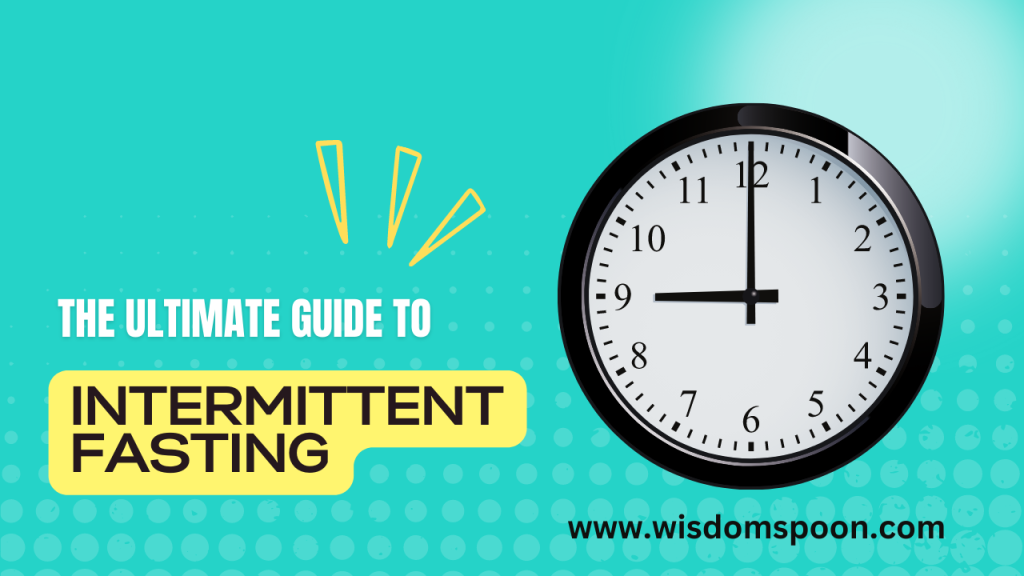Intermittent fasting is a popular health trend that involves alternating periods of fasting and eating. It has gained popularity in recent years for its potential health benefits, including weight loss, improved insulin sensitivity, reduced inflammation, improved heart health, and increased longevity. In this beginner’s guide, we’ll explore the basics of intermittent fasting, its health benefits, and how to get started.
What is Intermittent Fasting?
Intermittent fasting is an eating pattern that involves alternating periods of fasting and eating. There are several different types of intermittent fasting, but the most common include:
The 16/8 method
In this method, individuals fast for 16 hours and eat during an 8-hour window. This is the most popular form of intermittent fasting.
The 5:2 method
In this method, individuals eat normally for 5 days and restrict calories to 500-600 for 2 days.
Alternate-day fasting
In this method, individuals eat normally one day and then fast the next.
Interestingly, intermittent fasting does not restrict what individuals can eat, but rather when they can eat. During the eating periods, it’s important to consume nutrient-dense foods to ensure adequate nutrition.
Health Benefits of Intermittent Fasting
Intermittent fasting has been shown to have several health benefits, including:
Weight loss
Intermittent fasting can help individuals lose weight by reducing calorie intake and increasing fat burning.
Improved insulin sensitivity
Intermittent fasting can improve insulin sensitivity, which can reduce the risk of type 2 diabetes.
Reduced inflammation
Intermittent fasting can reduce inflammation in the body, which has been linked to several chronic diseases.
Improved heart health
Intermittent fasting can lower blood pressure, cholesterol, and triglyceride levels, which can improve heart health.
Increased longevity
Intermittent fasting has been shown to increase lifespan in several animal studies, and some research suggests it may have similar effects in humans.
How to Get Started with Intermittent Fasting
Before starting intermittent fasting, it’s important to consult with a healthcare professional, especially if you have any underlying health conditions or are taking medications. Once you have the green light, here are some tips to get started:
Choose a fasting method
Decide which fasting method works best for your lifestyle and schedule. The 16/8 method is the most popular and easiest to implement.
Set a schedule
Choose a time window for eating and fasting. For example, if you choose the 16/8 method, you might eat between 12 pm and 8 pm and fast between 8 pm and 12 pm the next day.
Start slowly
If you’re new to intermittent fasting, start with a shorter fasting period, such as 12-14 hours, and gradually increase to your desired fasting period.
Stay hydrated
Drink plenty of water during fasting periods to stay hydrated.
Eat nutrient-dense foods
During eating periods, focus on consuming nutrient-dense foods, such as fruits, vegetables, whole grains, and lean proteins.
Listen to your body
If you feel lightheaded or weak during fasting periods, break your fast with a small meal or snack.
Be consistent
Stick to your fasting schedule as much as possible to see the best results.
Potential Risks of Intermittent Fasting
While intermittent fasting has many potential health benefits, it’s important to be aware of the potential risks. These may include:
Low blood sugar
Intermittent fasting can cause low blood sugar, especially for individuals with diabetes or other blood sugar disorders.
Nutrient deficiencies
If individuals do not consume nutrient-dense foods during eating periods, they may develop nutrient deficiencies.
Binge eating
Some individuals may experience binge eating or overeating during eating periods, which can negate the benefits of fasting.
Increased stress
Fasting can increase stress levels in some individuals, which can have negative effects on overall health.
Disordered eating
Intermittent fasting can potentially trigger disordered eating patterns in some individuals, especially those with a history of eating disorders.
Most Frequently Asked Questions about Intermittent Fasting
Question 1: How does intermittent fasting work?
Intermittent fasting works by reducing calorie intake and increasing fat burning during fasting periods.
Question 2: Is intermittent fasting safe?
Intermittent fasting can be safe for most people, but it’s important to consult with a healthcare professional before starting, especially if you have any underlying health conditions.
Question 3: Does intermittent fasting lead to weight loss?
Yes, intermittent fasting can lead to weight loss by reducing calorie intake and increasing fat burning.
Question 4: How long does it take to see results with intermittent fasting?
The results of intermittent fasting can vary, but most people see results within a few weeks to a few months.
Question 5: Can I drink water during fasting periods?
Yes, it’s important to drink plenty of water during fasting periods to stay hydrated.
Question 6: Can I consume caffeine during fasting periods?
Some forms of intermittent fasting allow for the consumption of caffeine, but it’s best to avoid adding sugar or cream.
Question 7: Can I exercise during fasting periods?
Light exercise is usually safe during fasting periods, but it’s important to listen to your body and avoid overexertion.
Question 8: Can I eat whatever I want during eating periods?
While intermittent fasting does not restrict what you can eat during eating periods, it’s important to focus on consuming nutrient-dense foods to ensure adequate nutrition.
Question 9: Can intermittent fasting improve insulin sensitivity?
Yes, intermittent fasting has been shown to improve insulin sensitivity, which can reduce the risk of type 2 diabetes.
Question 10: Can intermittent fasting reduce inflammation?
Yes, intermittent fasting can reduce inflammation in the body, which has been linked to several chronic diseases.
Question 11: Can intermittent fasting improve heart health?
Yes, intermittent fasting can lower blood pressure, cholesterol, and triglyceride levels, which can improve heart health.
Question 12: Can intermittent fasting increase longevity?
Intermittent fasting has been shown to increase lifespan in several animal studies, and some research suggests it may have similar effects in humans.
Question 13: Can intermittent fasting lead to muscle loss?
Intermittent fasting can potentially lead to muscle loss if protein intake is not adequate during eating periods.
Question 14: Can intermittent fasting trigger disordered eating patterns?
Intermittent fasting can potentially trigger disordered eating patterns in some individuals, especially those with a history of eating disorders.
Question 15: Can intermittent fasting lead to binge eating?
Some individuals may experience binge eating or overeating during eating periods, which can negate the benefits of fasting.
Question 16: Can intermittent fasting be combined with other diets?
Intermittent fasting can be combined with other diets, but it’s important to ensure adequate nutrition during eating periods.
Question 17: Can intermittent fasting be done long-term?
Intermittent fasting can be done long-term, but it’s important to consult with a healthcare professional and listen to your body.
Question 18: Is intermittent fasting right for everyone?
Intermittent fasting may not be suitable for everyone, especially pregnant or breastfeeding women, children, individuals with a history of eating disorders, or those with certain medical conditions. It’s important to consult with a healthcare professional before starting intermittent fasting to ensure it’s safe and appropriate for your individual needs.
Question 19: How often should I do intermittent fasting?
The frequency of intermittent fasting can vary depending on personal preference and individual needs. Some people may choose to fast once or twice a week, while others may fast every other day or every day. It’s important to listen to your body and adjust the frequency of fasting as needed.
Question 20: Can I continue taking my medication during fasting periods?
It’s important to consult with a healthcare professional before continuing to take medication during fasting periods. Some medications may need to be taken with food, so it’s important to ensure that you’re still taking medication as prescribed.
Question 21: What can I do to reduce hunger during fasting periods?
Some strategies for reducing hunger during fasting periods include drinking plenty of water, consuming caffeine or tea, distracting yourself with activities or work, and gradually increasing the length of fasting periods to allow the body to adjust. It’s important to listen to your body and adjust fasting periods as needed to ensure adequate nutrition and avoid excessive hunger or discomfort.


